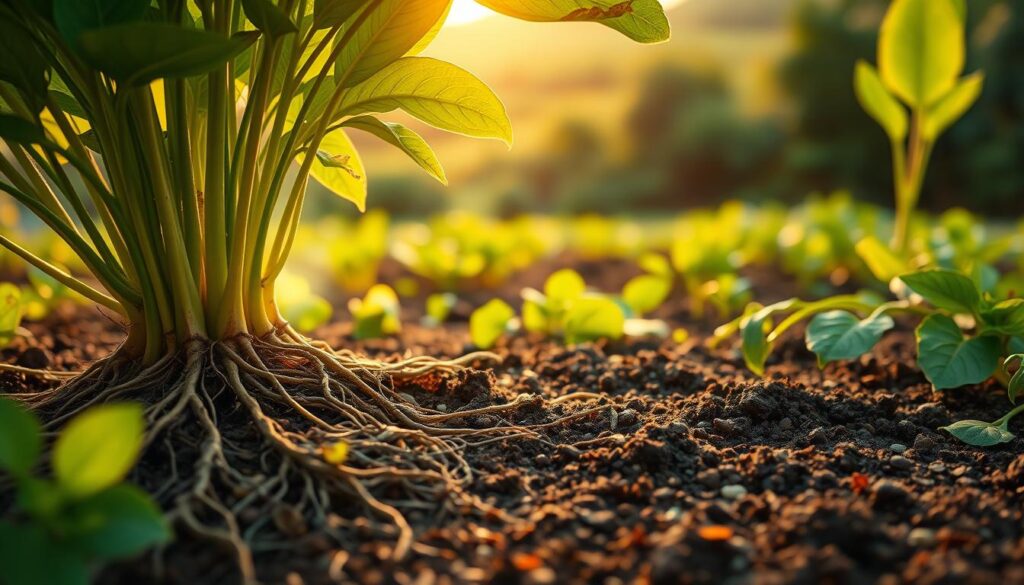In our fast-changing farming world, using smart plant fertilization is key for any farmer wanting better growth and productivity. It brings together new technology and old practices for smarter nutrient use. This boosts soil health and helps our environment.

Seek App
Exploring different ways to fertilize can greatly boost how much crops we get. It makes farms run smoother, too.
Anúncios
Understanding Smart Plant Fertilization
Smart plant fertilization uses advanced technologies to make nutrient application in farming better. It tackles the problems old methods cause. Problems like nutrient runoff and harm to nature. So, smart fertilization is key for growing crops in a way that’s good for the earth.
Definition and Importance
Smart fertilization involves techniques that control when nutrients are released. This fits what plants need and helps them grow strong. At the same time, it reduces harm to our environment. Smart fertilization makes sure nutrients are there for plants at the right time. This keeps nature in balance, unlike old ways.
Anúncios
Comparison with Traditional Fertilization Methods
Old-style fertilization spreads nutrients everywhere, without looking at soil or what different plants need. This can waste nutrients and hurt the environment. But, smart fertilization looks closely at soil and plants. It gives nutrients in a way that’s just right. This cuts down waste and is much better for our planet.

The Science Behind Plant Fertilization
It’s crucial to understand plant nutrients for better growth in farming. Healthy plants need many key nutrients for their growth and health. Knowing what’s in the soil helps make sure crops get what they need to grow well.
Essential Nutrients for Plant Growth
Nitrogen, phosphorus, and potassium are key for plants. Nitrogen helps leaves grow and is key for making food using sunlight. Phosphorus supports root and flower growth. Potassium helps with water use and nutrient absorption. There are smart ways to give these nutrients in the right amounts for different crops.
Soil Composition and Crop Requirements
The makeup of soil affects how plants get nutrients. Things like soil pH, moisture, and organic matter play big roles. By testing the soil, farmers can figure out these details. This helps them make sure plants get the right nutrients to grow best.
Benefits of Using Smart Fertilization Techniques
Smart fertilization techniques bring big benefits for farming and the environment. They use precision to boost how much farmers can grow. This helps farms work better and care for the planet at the same time. Everyone benefits – from the farmers to the whole ecosystem.
Increased Yields and Improved Quality
Precision fertilization boosts how well crops grow and their quality. It uses smart tech like sensors and data to feed plants just right. This makes plants healthier and increases what farmers can harvest.
Environmental Impact and Sustainability
Smart fertilization cuts down on unnecessary fertilizer. This protects the soil and water from pollution. It’s a way for farmers to be kinder to the planet while still growing lots of food. These methods lead to a better environment and stronger farms.
Understanding Precision Fertilization
Precision fertilization is a modern way to boost farm productivity by applying nutrients tailored to needs. It relies on four key principles. These principles ensure nutrients are used efficiently and sustainably. By considering the crop’s needs and soil condition, precision fertilization is crucial for good crop management.
Principles of Precision Fertilization
The success of precision fertilization rests on the 4R principles:
- Right Place – Nutrients must be applied where crops can efficiently utilize them.
- Right Rate – Figuring out the best nutrient amount for crops helps avoid waste.
- Right Time – Applying nutrients at the right time maximizes their use.
- Right Source – Picking the right fertilizer type helps crops absorb nutrients better.
Following these guidelines helps farmers use resources smarter, cutting down on costs and the environmental harm traditional methods might cause. It all leads to better crop growth, higher yields, and more efficient farming.
Implementation Across Different Farm Types
Precision fertilization works for all types of farms, from big commercial ones to small family-run ones. Each kind of farm adapts precision farming in its unique way. Here are some adaptations:
- Big commercial farms might use high-tech tools like GPS and drones to apply nutrients precisely.
- Smaller farms might use manual soil testing and simpler methods to adjust how they fertilize.
- Mixed operations could mix advanced technology and traditional methods for the best results.
This shows that precision fertilization is flexible and can help farms of all sizes produce more efficiently.
Data Collection Methods for Effective Fertilization
For better fertilization in farming, collecting right data is key. We mainly use two methods: soil testing and crop sensors. These methods make sure plants get needed nutrients, thanks to new farming tech.
Soil Testing Techniques
Soil testing is basic for knowing what the soil lacks. We:
- Collect soil samples from different areas in a field.
- Send these samples for a detailed checkup.
- Use the results to make a plan for adding nutrients.
This way, we only use the fertilizer we need, which helps crops grow better. Knowing the soil well leads to smarter choices in fertilizer use, increasing both crop quantity and quality.
Crop Sensor Utilization
Crop sensors are a cool, new way to gather data. They tell us about things like water, heat, and nutrient amounts in real time. With these sensors, farmers can:
- Watch over crops all the time.
- Change fertilizer use based on what crops need right away.
- Quickly deal with any problems found by the sensors.
Adding crop sensors to farming tools helps take care of plant needs better. This leads to healthier plants and bigger harvests.
Methods and Technologies in Smart Plant Fertilization
Modern farming has changed a lot with new methods and technologies. These include precision irrigation and special software that help farms be more sustainable and efficient. They let farmers use just the right amount of water and nutrients, making plants healthier and reducing harm to the environment.
Innovative Precision Irrigation Systems
Precision irrigation systems water plants right at their roots, which cuts down on waste. They use moisture sensors and weather data for precise watering. This saves water and fits perfectly with smart nutrient use, improving plant health and supporting eco-friendly farming.
Crop Management Software Solutions
Today’s agricultural software is a big help in managing fields better. It gathers data and monitors crops in real-time, so farmers understand soil and plant conditions. With this tech, they can make smart choices that boost harvests and use resources wisely, supporting greener farming while tackling nutrient management.
Challenges in Implementing Smart Plant Fertilization
Smart plant fertilization brings several challenges for farmers. As agricultural technology grows, knowing these challenges is key. This knowledge helps farmers effectively add new methods to their work.
Initial Costs vs. Long-Term Benefits
High costs can stop small and medium-sized farmers from using new fertilization tools. The first expenses often include buying equipment and software. Though pricey initially, many find the long-term gains, like better crops and less resource use, worth it. These benefits support sustainable, efficient farming, making the initial costs a wise investment.
Need for Farmer Education and Training
Training is vital for successfully using smart fertilization. Farmers must learn to use new technologies and methods to get the most out of them. Education programs give farmers the skills and knowledge they need. These programs help deal with the complexity of new tools, boosting farmer confidence in using technology to improve their work.
Future Trends in Plant Fertilization
The future of fertilizing plants is about to change a lot. We are seeing AI come into farming, along with site-specific nutrients. These changes are going to make fertilizing crops more effective and better for our planet.
Integrating AI with Fertilization Techniques
AI is getting big in farming and changing how we fertilize. It looks at a lot of data to create the best fertilizer plans for each crop. AI and machine learning will make sure plants get just what they need, cutting down on waste and boosting their health.
Advancements in Site-Specific Fertilizers
New technology is bringing us fertilizers made just for certain crops and soils. These special fertilizers are more efficient and better for the environment. They make sure crops get exactly what they need, saving resources and fitting perfectly with precise, sustainable farming.
Real-Life Applications of Smart Fertilization
Smart fertilization techniques have changed farming and gardening for the better. They improve crop growth and soil quality, all while being kind to the environment.
Case Studies in Commercial Agriculture
Success stories from big farms show how smart fertilization works wonders. A vineyard in California saw more grapes of higher quality thanks to precision fertilization. They used soil sensors and targeted nutrients.
This approach helped them use less fertilizer but make more money. Technology like this makes farming more efficient and eco-friendly.
Home Gardening Innovations
Advanced gardening isn’t just for big farms. Even home gardeners are using new methods to get better results. For instance, automated drip irrigation feeds plants the exact amount of water and nutrients they need.
This smart system helps plants thrive and saves water and fertilizer. It’s perfect for gardeners who don’t have much space.
Conclusion
Smart fertilization is changing farming for the better. It uses new methods to help crops grow more and protect nature. With technology, farmers make sure plants get exactly what they need to grow well. This way is key to helping feed more people around the world.
This approach also helps the planet. It makes farming more about keeping our resources and less about harming nature. Looking ahead, using these smart methods will be crucial. They will help farms last longer and be better for the earth.
In the end, smart fertilization does more than just help today’s food needs. It looks to the future, aiming to make farming good for the earth and people. By thinking of benefits that last longer and the health of the environment, farming can be a force for good.



